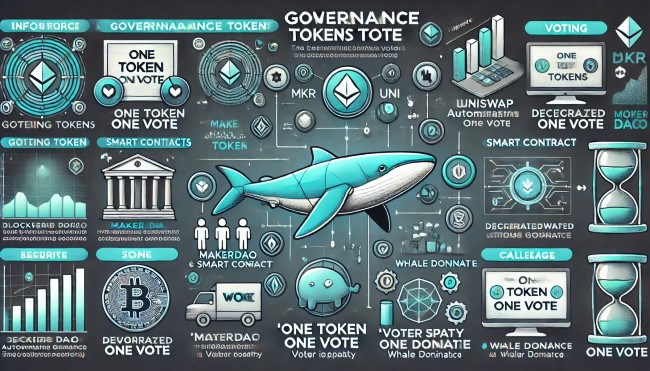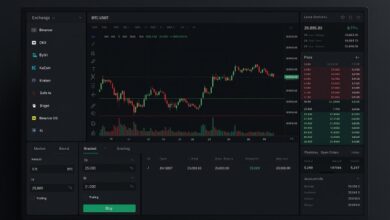Governance Tokens: Enhancing the Integrity of Blockchain Protocols

Governance tokens are crucial to decentralized finance (DeFi) and blockchain ecosystems. They grant token holders the ability to influence protocol decisions and ensure that the project remains decentralized. This decentralized governance model helps align the interests of the community with the protocol’s long-term goals, ensuring transparent, democratic decision-making without relying on centralized authorities. Additionally, if you want to know more about investments and firms, you may visit this Homepage.
How Governance Tokens Work
Governance tokens operate on the principle of “one token, one vote,” granting holders proportional influence based on the number of tokens they own. These tokens are typically issued by a protocol and used to vote on various proposals, ranging from protocol upgrades to fund allocation. Voting is executed through smart contracts, which automate and secure the entire governance process, ensuring transparency and preventing tampering.
For example, in MakerDAO, MKR token holders vote on key decisions related to the DAI stablecoin, such as setting interest rates or managing collateral requirements. Similarly, Uniswap’s UNI token holders have the power to propose and vote on changes to the decentralized exchange’s operational structure.
These voting mechanisms ensure that changes to the protocol are community-driven, aligning the platform’s development with the interests of the token holders. Additionally, some governance systems allow for the delegation of voting power, enabling token holders to assign their votes to others they trust to represent their views, thus encouraging wider participation.
The Importance of Governance Tokens for Decentralized Governance
Governance tokens represent a critical step in maintaining the decentralized nature of blockchain protocols. By distributing voting power across the community, they prevent centralization, which is a key threat to the ideals of blockchain technology. Decentralized governance ensures that no single entity or small group can unilaterally make decisions that could negatively affect the community or skew the system in their favor.
In decentralized autonomous organizations (DAOs), governance tokens provide a true democratic framework. For instance, Compound (COMP) uses its governance tokens to allow users to propose changes to interest rates, collateral factors, and even the allocation of development funds. This decentralized approach ensures that the evolution of a protocol is reflective of the majority of its community members, maintaining the integrity of the system and fostering trust.
Enhancing Integrity and Security Through Decentralized Governance
Governance tokens not only decentralize decision-making but also enhance the security of blockchain protocols. Since decisions are made through open, verifiable smart contracts, the voting process is transparent and immutable. This reduces the likelihood of tampering or fraud, as every vote and decision is recorded on the blockchain, and outcomes are based purely on the voting results.
This form of governance also provides a defense against the risks associated with centralized decision-making. In a traditional setup, a central authority could manipulate outcomes or act in its own interest rather than the community’s. With governance tokens, the community collectively decides on critical protocol updates, from security patches to consensus algorithm changes, making the protocol more resilient and adaptable to potential vulnerabilities.
Challenges and Risks in Governance Token Systems
While governance tokens offer numerous benefits, they are not without challenges. One major issue is voter participation. Many token holders remain passive, failing to vote on important issues. This voter apathy can lead to decision-making being dominated by a small group of active participants, which undermines the goal of decentralization.
Another significant challenge is the centralization of voting power, commonly referred to as “whale dominance.” Large token holders, known as whales, can accumulate a disproportionate amount of governance tokens, allowing them to sway decisions in their favor. This centralization risk contradicts the very ethos of decentralization and can lead to unfair outcomes, especially in critical decisions such as funding allocations or protocol direction.
Security vulnerabilities also exist, particularly within the smart contracts that govern these tokens. If a flaw is found in the governance mechanism, it can be exploited, potentially leading to unauthorized changes in the protocol or governance takeover.
The Future of Governance Tokens: Trends and Innovations
Governance tokens continue to evolve, with many projects seeking to expand their utility beyond just voting. Some protocols are tying governance tokens to other rewards, such as staking or yield farming. For instance, PancakeSwap’s CAKE token allows holders to earn rewards by staking their tokens while also participating in governance decisions.
Moreover, new blockchain protocols are experimenting with hybrid governance models that combine on-chain voting with off-chain governance frameworks. This approach aims to solve issues like low voter participation by making governance more accessible and scalable.
The future of governance tokens could also see their integration into more diverse ecosystems, such as non-fungible tokens (NFTs) and decentralized identity systems, further expanding their influence and utility.
Conclusion: The Road Ahead for Governance Tokens
Governance tokens represent a significant advancement in the quest for decentralized governance. They allow for community-driven decision-making while enhancing the security and transparency of blockchain protocols. However, challenges such as whale dominance and voter apathy must be addressed to ensure that these tokens fulfill their potential in fostering true decentralization.



